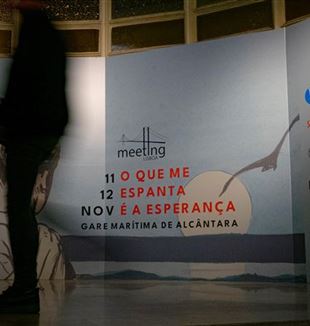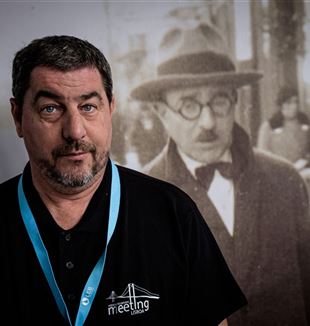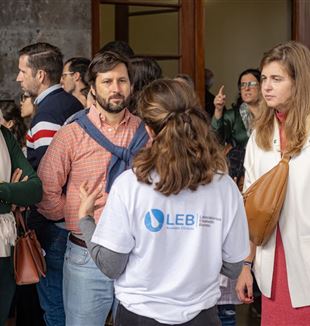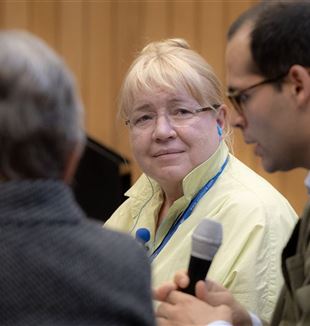
Meeting Lisboa: the enchantment of hope
Artificial intelligence, Péguy's conversion, working in the 21st century, Pessoa's infinity, Andrea Mandelli's spring, the search for goodness inside the Gulag... Two days to embrace everything in the Portuguese capital, November 11-12."Five minutes before the first mass of the movement, song in the movement was born. The beginning of song in the movement is the beginning of the movement. There is no difference. The movement is born and we sing." The beginning of the first day of the Meeting Lisboa immediately reminded me of Fr. Giussani's words. I was overcome with emotion when I entered the hall to watch (unexpectedly) a show recounting my story: the mini Meeting. I could not imagine what would happen. There were the pupils of the Colégio de São José do Ramalhão who, with the help of their teachers, thought to involve us in a moment of song born from the experience of the meeting with Fr. Giussani and Fr. João Seabra.
That is how the Meeting began and the singing began; there is no better way to express gratitude for what we have encountered than through singing. I was struck by this first moment of the weekend because those children really had something to teach me: I will be all the more a man the more I live with simplicity in the face of reality, that is, the more I learn to sing like those children.
The morning meeting on artificial intelligence helped us deepen our attempt to identify the characteristic traits of the human being. Can the machine replace the human? The person possesses a form of knowledge that the machine can never have: that which is obtained through a relationship with the object, where I learn its meaning. Patriarch Monsignor Rui Valério also helped us in this work. This is how he opened the meeting: “Man can live in communion, in relationship with the other; this is something that the machine will never be able to imitate.”
In the last meeting of the first day we were joined by the Bishop of Lamego, Monsignor António Couto, for a dialogue on the theme of the Meeting, 'What amazes me is hope'. The Bishop began by recalling Jeremiah's dialogue with God in the first chapter of the Book of the Prophet Jeremiah. To God's question "What do you see, Jeremiah?", Jeremiah replied "I see an almond tree branch". God then replied, "You have seen well, for I watch over my word to fulfil it.” The almond tree, in fact, is the first to blossom in winter and is therefore a sign of hope, because it foreshadows what will happen to all the others: with the right commitment and proper care, they will all blossom in their own time.
It is no coincidence that at the end of the day we were confirmed (or reminded), through the Bishop's words, that God's promise is still alive: "You have seen well". In other words, you have not been mistaken, what you see happening in front of you is not a figment of your imagination. The almond blossom is blossoming now, in the present circumstance. That is why I was also struck by what the Bishop said at the end of the meeting: we are called to simplicity, to let our lives reflect the certainty that the almond tree is blossoming. Rather than simply looking for a demonstration of how this happens, the Bishop invited us to put ourselves out there, to risk verifying in our lives that the promise foretold by the almond tree in bloom is true, because it is already being realised today.
This same simplicity was what defined Péguy's life, on which our friends put on a beautiful show that concluded the Saturday. Once, when a friend asked him about his conversion, Péguy replied: “I have always followed the same path, and it is this that has brought me to where I am.” Risking following what was happening to him, he ended up rediscovering his faith – as he put it – “in an event. When it happens, it happens forever.” This encounter with Christianity started from the facts of reality, as he himself said, and took nothing away from his humanity; on the contrary, he remained himself, albeit within a newness of life.
Sunday opened with the meeting ‘Working in the 21st century: to what end?’. Bernhard Scholz, President of the Rimini Meeting, told us how in his own life, when faced with the problem of work, the ultimate question emerges: who am I? For work not to become an alienation from reality, I have to ask myself a question about the meaning of what I do. In fact, this question will always emerge. Scholz gave an example: to pay for his studies, he worked for several months changing light bulbs all day long; it was tiring and he did not like it very much. Where can I find the strength to continue, to not give up the idea of studying? I have to ask myself again: what is the point, why am I doing this? Nuno Pinto Magalhães, the other speaker at the meeting, provided a clue: the gusto, the passion for work is discovered by “getting your hands dirty.” By getting involved in what I do, I discover, Scholz continued, that the answer to the question "Why do I work?" is not to be found in the work itself. Christianity shows me the way: it does not depend on what I do, but on the meaning of what I do.
The exhibition that gave rise to the meeting illustrated this point very well. To the 'performative self' that today's world proposes to us, a self that is measured by what it is able to achieve, Christianity responds by offering a radically different hypothesis. If I recognise myself as infinitely, unconditionally loved, I become more creative, more effective, more intelligent in relation to reality. As a result, I can more easily grasp that meaning in my work which I have already intuited in my life through the love of which I am the object.
This same search for meaning was one of the main features of another exhibition in this edition of the Meeting, 'If I want, I want infinity'. The story of the encounter that some of us (myself included) had with Fernando Pessoa was born from the recognition that, like him, I too seek an answer to the cry of my heart above all. There is a structural tension in me to discover 'the eternal newness of the world' in every moment and in every little thing.
One of the insights that moves me most in all of Pessoa's poetry is that this road to discovering who I am cannot be travelled alone. It takes someone, a friend, for me to keep walking. It is impressive to see how Pessoa writes the following poem after almost constantly doubting the existence of this path:
Love is a companion.
I no longer know how to walk alone along the path,
Because I already cannot longer walk alone.
"The Loving Shepherd", Alberto Caeiro
Pessoa wrote these verses after falling in love with Ofélia Queiroz, with whom he later had an affair. Indeed, when someone realises that they are loved, they see signs of hope in life. The love they had been searching for all their life was something concrete: it was encountered through people, in flesh and blood, who walk side by side with me. The living proof that there is something irreducible in the human heart is the story of Andrea Mandelli, recounted in another of the exhibitions: 'I will gift you my spring'. Andrea grasped a dramatic point in life: to embrace circumstances is to embrace Christ. That is why this young man experienced the illness that led to his death at the age of nineteen in a totally new way, because he had a clear awareness that his vocation lay there.
Nothing of his humanity was lost, on the contrary, it is impressive to think that, within the pain he was experiencing when he was in hospital he always asked for his friends. He had such a deep friendship with them that he said: “What I miss most in the situation I am in is the physical presence of Christ who is in you.” Likewise, his illness was an opportunity to realise that all reality is interesting, because everything is an opportunity to know myself better, that is, to grasp how in everything there is a relationship with the meaning of life. Studying, which had always been difficult for Andrea, became central during his time in hospital, and he experienced it with a totally new commitment.
Read also - Seville: the first Encuentro
Some very familiar words to Andrea, ‘Caution. Danger of life and death. Always' helped to introduce us to the last meeting of this year's Meeting, 'Men despite everything', about the Russian Memorial Association, founded with the aim of keeping alive the memory of all those who lost their lives or simply 'disappeared' during the years of the communist regime. There is always, in fact, the possibility of living, even in the most adverse circumstances such as in the Gulag. A real life, searching for something.
As was said during the meeting, the stories in the Memorial archive are the story of the search for the seed of good that man always represents. Always! Because, despite everything, man remains man. The exhibition, in the many examples it presented, proved that this miracle happens: something subverts the mechanical logic of evil. People's testimonies interrupt this logic. In so many of them, we saw how the desire for genuine affection for their son or wife was not lost, and that is why it is worth risking one's life to prepare something for them (a garment, a drawing). As Marta dell'Asta said: “Hope does not lie in the fact that man will never fail, but in the fact that he always starts again. The reasons for such hope lie in people.”


